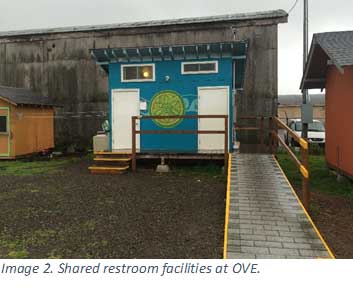“Opportunity Village is the stepping stone of my transition into society. After only a few months of living there, my girlfriend and I now are living a life where we are able to sustain a home on our own after being homeless for 2 years. Thank you Opportunity Village.” — Sam Johns (as seen on Opportunity Village’s homepage)
This quotation shows how vital Opportunity Village Eugene (OVE) has become to the local unhoused community. More than providing physical homes, OVE has become a glimmer of hope for people transitioning out of homelessness. Finding housing is one challenge for the unhoused, but possibly an even larger barrier is reintegrating into mainstream society. OVE helps residents access the services they need to find work or pursue their education, in order to make this transition possible. As a Community Planning Workshop team, we had heard about how the village also provides residents with a supportive community that encourages self-sufficiency. During our recent visit to OVE this self-supported, communal atmosphere was apparent.
Visiting OVE was an enlightening experience for our team because we got to see firsthand one of the programs we are evaluating. There is a difference between reading technical documents about a program’s operation, and being given a guided tour by a resident. Opportunity Village is the first of its kind in Eugene. Its mission is to create self-managed communities of low-cost, tiny houses for those in need of housing. It is governed by a village council, where residents are nominated by other residents. The primary role of the council is to uphold orderly management of the Village. OVE also has a Board of Directors, which acts as a non-profit organization to ensure that the OVE is in compliance with its agreement with the city.
During the visit, we were impressed by the organization and structure of the camp: we were greeted by a man doing his camp volunteer hours at the front desk where we signed in and were handed nametags. All of the structures are either micro-houses (tiny houses) or conestoga huts (6 x 10 foot structures that can be built for between $250 and $500). The micro-houses and huts are neatly spread throughout the camp area, and are all decorated in their own unique way. Many are painted bright colors, and it is clear that residents feel at home.
Reading about camp rules and then actually visiting the site, it was apparent that the rules are not just treated as a superficial set of guidelines: they are embraced by the residents. Residents follow the rules limiting the distance that their belongings can spread around their houses, and some residents have even built small, covered storage areas to keep their belongings dry. Requiring residents to participate in several hours of weekly community work strengthens the sense of ownership that they feel. This was apparent in the pride and gratitude expressed by one of our guides.

We were particularly taken by the sense of community at the camp. Much of the space is shared, such as the garden, kitchen area, and the central community space. When it started raining, we retreated to the community area where quite a few residents were working on computers or reading. Listening to the rain on the roof and being surrounded by signs of community investment such as the shared library and whiteboard listing the agenda for an upcoming camp meeting, we couldn’t help but feel comfortable, cozy, and like we would enjoy living at OVE.
In the next few weeks, the Eugene Rest Stop and Micro Village Program Evaluation team will be conducting in- person interviews at OVE and city rest stops. These interviews will help us develop a stronger understanding of how the programs impact the lives of the unhoused and help them transition into permanent housing. To learn more about Micro-homes and OVE, check out this video from MSNBC (January, 2015).
 About the authors: Emily Brown and Henry Hearley are both in their first year of the Master of Community and Regional Planning program. They both enjoy taking advantage of Oregon’s beautiful outdoor scene and love to run. They are also enjoying their CPW project, and appreciate the chance to learn about how cities can better provide housing for unhoused residents.
About the authors: Emily Brown and Henry Hearley are both in their first year of the Master of Community and Regional Planning program. They both enjoy taking advantage of Oregon’s beautiful outdoor scene and love to run. They are also enjoying their CPW project, and appreciate the chance to learn about how cities can better provide housing for unhoused residents.

